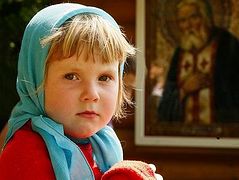Once I happened to take my little granddaughter to Sunday Services at a church on the south side of Moscow. It was a magnificent church with blue cupolas, built recently, and it was joyful to see its beauty and perfection transforming the dingy, monotonous, grey landscape of this typical subdivision.
After praying and receiving Holy Communion, we remained in the church, talking to an old friend who works here along with a group of other volunteers like her, who do everything, notice everything, know everything, and… are always teaching someone.
The previously full church became empty, except for the crowd of people around the candle store and two young priests talking with parishioners. A few little children, three-year-olds like my granddaughter, were biding the time while their mothers stood in line by playing games and happily shouting as they ran around the empty church.
One of the volunteer workers suddenly yelled loudly and piercingly, “Whose children are these? Take them outside right now. This is a temple of God and not a playground.”
Although my granddaughter had not yet gotten into the light-hearted game she was clearly bent on joining the noisy company, but now she jumped into my arms and rattled into my ear, “Grandpa, let’s go, I’m afraid of this place. God isn’t in charge here—a mean lady is.
The rest of the children also quickly stopped in their tracks and some of them went weeping to the arms of their parents or grandparents.
The infuriated volunteer did not back off. “You’ve come to church, now behave yourselves properly! And if you can’t keep your children quiet then don’t drag them here—leave them at home.”
She started screaming louder and louder, her voice increasing in pitch. The priests who were talking with the parishioners did not reproach her. Apparently they were used to her, or just didn’t want to get involved. The adults with their children in their arms left the queue and headed for the exit.
 Photo: A.Sandu
Photo: A.Sandu When another priest heard the ruckus, he climbed up the stairs leading to the lower side of the church, and when the self-appointed boss who had gone quite out of control saw him, she cut short her angry monologue and dived for the desk. Father stopped her, quietly but authoritatively.
“Wait a minute dear, come over here. What is your name? Seraphima? Look at that—your parents did not give you an ordinary name, but a lofty, angelic one. After all, the Seraphim and Cherubim are the closest angels to God. And what are you doing, handmaiden of God Seraphima? You are kicking God’s angels out of the church. Who gave you the authority to do that? Did you acquire it yourself? After all, the Lord Himself rejoices when He hears angelic voices in the church, but you don’t like it.
Father talked softly but his voice could be heard throughout the church, and the parents with their children who had intended to leave returned and gathered around him in a half-circle. The children calmed down and looked at the priest, who continued talking, only this time to the parents.
“Carry these pure, bright, and unsullied angels of God in your arms and take them by the hand. Delight in God’s love for you and trust in you. He has entrusted His angels to you, He has shown His mercy to you, and given you the will to bring them to Him. Whether they will stay with God and grow up in the faith, or reject Him and wallow in unbelief, all depends on your will and choice. Remember this, and take care of your angels.”
“And you, Seraphima, bring me a box of icons of the Mother of God,” Father said to the now humbled owner of that exalted name.
I was standing with my granddaughter in my arms right next to the priest, and so the first little icon came into her hands. The girl took the icon and looked at it attentively, kissed it, and carefully tucked it into the breast pocket of her jumper. The other children did exactly the same thing when they received their own unexpected gift: they kissed the icon and put it in their pockets or pressed it to themselves.
After entrusting an icon to the last child and blessing him, the priest looked at Seraphima and said, “Did you see, handmaiden of God, how close they are to the Lord God and to the Most Pure Mother of God? Each and every one of them first looked at the icon of the Virgin and then, as if she were their own mother, tenderly and lovingly kissed it and then carefully placed it next to their hearts. And now have a look at the adults. You took an icon and without particularly looking at it put it in your bag of groceries. When you get home you’ll first put away the groceries and then put the icon in its place. But you cast the children out of the church, and push them away from God.
“Forgive me, father, I am sorry. Bless me,” said the shamed Seraphima, nearly crying.
Father blessed her and good-naturedly dispensed his directives:
“Now put your angels down to the Earth and finish your business. And you, handmaid of God Seraphima, look after them and do your work. Angels are good—they may even forgive your mistake.”
He called the young priests over and said something sternly to them, stood a moment looking at Seraphima as she told a story to the children now gathered around her, and then quietly went back down the stairs.
My bright little angel also forgave the irascible Seraphima and stood for a bit with the attentive and concentrated little listeners. As we were walking home, she asked me several times, “Grandpa, when will we go to that church again? It’s really good in there.”
I looked into her pure, bright little eyes, and I wanted to shout aloud—very loud, for everyone to hear:
“Don’t offend the children! Take care of the Angels!”





